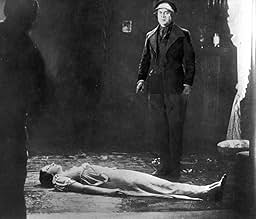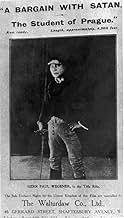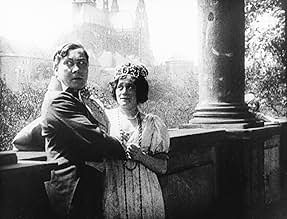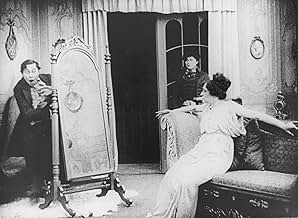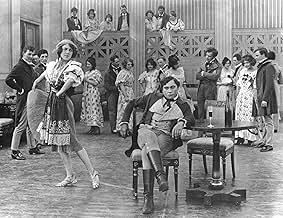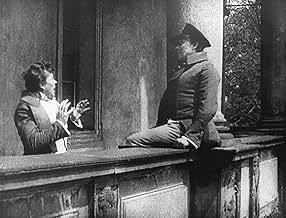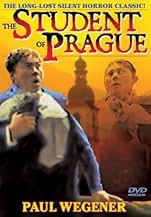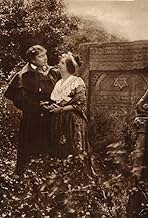The poor student Balduin sells his mirror image to the satanic sorcerer Scapinelli. He falls in love with a countess and tries to win her over. But his mirror image receives a life of its' o... Read allThe poor student Balduin sells his mirror image to the satanic sorcerer Scapinelli. He falls in love with a countess and tries to win her over. But his mirror image receives a life of its' own and sabotages Balduin's every move.The poor student Balduin sells his mirror image to the satanic sorcerer Scapinelli. He falls in love with a countess and tries to win her over. But his mirror image receives a life of its' own and sabotages Balduin's every move.
- Lyduschka, a Gypsy Girl
- (as L. Salmonowa)
- Self - with cap at Belvedere
- (uncredited)
Featured reviews
Based on Edgar Allen Poe's short story "William Wilson," "The Student of Prague" contains several expressionistic features. Its set lighting, especially in the card-playing sequence, where the actors are highlighted at the table while the background is completely dark, was unique in 1913. This contrasting light/dark Chiaroscuro lighting would become a trademark in future German Expressionism films.
Also, the story lends itself to an expressionistic idea: a financially struggling student unwittingly accepts money for what turns out to be a soulless Doppelgänger (a mirror image of lead actor Paul Wegener, the student). Cinematographer Guido Seeber was able to create the double image within a single frame seamlessly, using the special effects split screen to convince his audience the witnessing of a real spiritual being whose ultimate existence is to ruin the student's life.
The director, Stellan Rye, who died early in World War One (November 1914) in a prisoner of war camp, used the landmarks of Prague to make his fantasy tale more believable, another Expressionist imprint. Lastly, the German obsession with traits that are ripe for expressionistic examination, narcissism and greed leading to ultimate destruction, are all addressed here as well as future German classics such as "The Cabinet of Dr. Caligari (1921)," " Nosferatu (1922)," and "Metropolis (1927)."
A renowned fencer asks a man named Scapinelli to procure him a winning lottery ticket, or a woman with a large dowry. The opening credits indicate Scapinelli is a sorcerer; he isn't used much in this film, and we don't know really anything about him when we first meet him, or what relationship Balduin has with him. In the remake, Balduin doesn't ask for those things, just wishes for a rich woman (not expecting the wish to come true), and Scapinelli promises to deliver.
A rich woman who is riding horses with her fiancé (also her first cousin) falls off her horse into a body of water, and Balduin saves her. In the remake, it's clear that Scapinelli guides her horse to Balduin and then causes the horse to act wildly, until Balduin scoops her off it. Here, it's unclear that Scapinelli had anything to do with it.
There are many scenes here that are reproduced in the sequel. Possibly even some of the same camera shots are copied.
The ending is not as powerful as the ending of the sequel. Still, this was interesting to watch and at the price of Alpha's DVDs, a bargain. Perhaps a better edition will come out sometime in the future.
Unfortunately, the most cinematic this film gets is the double exposure effects to make Paul Wegener appear twice within scenes. Guido Seeber was a special effects wizard for his day, but he's not very good at positioning the camera or moving it. Film scholar Leon Hunt (printed in "Early Cinema: Space, Frame, Narrative"), however, has made an interesting analysis on this film using framing to amplify the doubles theme: characters being split by left/right, near/far and frontal/diagonal framing of characters and shots. Regardless, the film mostly consists of extended long shots from a fixed position, which is noticeably primitive. Worse is the lack of editing; there's very little scene dissection and scenes linger. None of this is unusual for 1913, but there were more advanced pictures in this respect around the same time, including the better parts of "Atlantis" (August Blom, 1913), "Twilight of a Woman's Soul" (Yevgeni Bauer, 1913) and the short films of D.W. Griffith.
An expanded universal film vocabulary by 1926 would allow for a superior remake. Furthermore, the remake has a reason for the Lyduschka character--other than being an occasional troublemaker and spectator surrogate. Here, the obtrusively acted gypsy lurks around, seemingly, with a cloak of invisibility. I know their world is silent to me, but I assume, with their lips moving and such, that their world would not be silent to them, so how can Lyduschka leer over others' shoulders and not be noticed?
Nevertheless, this is one of the most interesting early films conceptually. Wegener, who seems to have been the primary mind behind it, in addition to playing the lead, would later play the title role and co-direct "The Golem" in 1920--helping to further inaugurate a dark, supernatural thread in German silent cinema.
(Note: The first version I viewed was about an hour long (surely not quite complete) and was in poor condition, with faces bleached at times and such. I'm not sure who was the distributor. I've also since seen the Alpha DVD, which, at 41 minutes, is missing footage present in the aforementioned print and also has fewer and very different title cards, but is visually not as bad. The repetitive score is best muted, though.)
The film is marred by some limitations arising out of the technically primitive state of 1913 filmmaking; the plot cries out for chiaroschuro effects, but the film is, of necessity, virtually all shot in shadowless daylight. But the scene where the reflection walks out of the mirror still packs a wallop.
More interesting for the trends it fortells than for its own sake, The Student of Prague is still worthwhile.
Did you know
- TriviaThis is sometimes considered to be the first horror film ever made.
- Quotes
Balduin, a Student: Ruined am I! Procure for me the luckiest ticket in the lottery or a dowered wife.
- Alternate versionsThere is an Italian edition of this film, included as Bonus Feature, on DVD "IL GOLEM" (1915), re-edited with the contribution of film historian Riccardo Cusin. This version is also available for streaming on some platforms.
- ConnectionsFeatured in Fejezetek a film történetéböl: A német film 1933-ig (1989)
- How long is The Student of Prague?Powered by Alexa
Details
- Release date
- Country of origin
- Official site
- Languages
- Also known as
- A Bargain with Satan
- Filming locations
- Hradschin, Prague, Czech Republic(view of the castle and it's surroundings)
- Production company
- See more company credits at IMDbPro
- Runtime
- 1h 23m(83 min)
- Sound mix
- Aspect ratio
- 4:3
- 1.33 : 1

